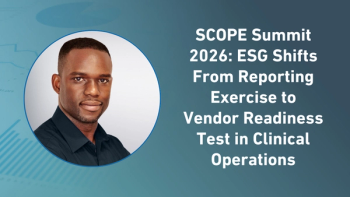
- Applied Clinical Trials-11-01-2021
- Volume 30
- Issue 11
Increasing Adherence With Dosing Reminders
Elderly patients achieved up to 98% compliance at 18 months on Phase III study.
Given everything else patients have going on in their lives, it can be an unsurmountable burden for people living with a chronic illness, such as elderly cardiovascular patients, to comply consistently with self-administered medication protocols.
While most clinical trials spend millions of dollars or more on clinical systems to improve data management, very few provide any meaningful support for patients at home to help them stay active and compliant.
Why aren’t more companies using these cost-effective and easy-to-implement solutions? Let’s take a look at one that did.
The impact of poor compliance
The importance of consistent medication adherence for studies with self-dosing requirements cannot be overstated. As has been reported in Applied Clinical Trials, poor compliance has an exponential impact on the number of patients needed to reach the same statistical outcome, shown in Table 1 below.
Research shows 40% of patients become non-compliant at 5 months on study.1 This means an average Phase III trial will require an additional 460 patients at an estimated cost of $12 million.2 Costs will be even higher for certain programs such as lengthy cardiovascular studies and complex oncology trials.
Opportunities to improve
Even an incremental improvement can make a significant difference in time and on the study budget. The Phase III trial referenced above would yield $335k in cost savings for each 1% increase in adherence.
As the following case study below shows, a technology-based dosing manager can help patients, even in the challenging elderly patient demographic, achieve compliance rates up to 98% at 18 months on study.
The challenge
A leading pharmaceutical company sponsored a cardiology trial that required elderly patients to self-administer cardiometabolic medication in tablet form 2x/day in a chronic fashion over multiple years. Published data for average medication adherence in cardiometabolic disease is 56% over 12 months. Twice-daily dosing has even lower adherence.3
The solution
For this Phase III trial the study team deployed a technology-based dosing mechanism. It helped improve medication adherence by using interactive SMS messages on patients' personal phones. The dosing manager solution sent protocol-specific automated text messages that prompted patients to take their medication at the scheduled time.
The system prompted patients twice daily with an SMS message that enabled them to quickly and easily confirm they had taken their dose—i.e., the patient would hit the Number one to confirm they took their medicine on time. In addition to ensuring compliance, easily access dosing records mitigated the risk of patients over-medicating because they forgot they had already taken a dose.
This simple process removed burden for elderly patients who (counter-intuitively) typically have higher technology compliance than younger people, in part because they have more spare time and stronger relationships with their care teams.
Sites received weekly compliance reports which allowed them to identify patients who would benefit from additional support and follow-up.
Maintaining patient engagement
In addition to a dosing manager, technology solutions which kept patients engaged during this trial included:
- Digital concierge
- Uber Health transportation
- Virtual visits (due to COVID)
- eConsent
Patients consistently demonstrated 2x/daily medication adherence at 70% and above throughout the duration of the trial. Patients treated at several major academic research centers reached as high as 98% adherence at 18 months on study, with an overall average compliance rate of 86.5%. A few of the research centers along with their patient adherence percentages can be found in Table 2 below.
Lessons learned
Technology providers should evolve their technology and service delivery best practices to ensure continual improvement in patient compliance.
This trial faced unique challenges and presented lessons learned technology providers can incorporate into future clinical trials, including…
- Make site participation mandatory—Keeping it optional means fewer patients will receive benefit from a dosing manager.
- Focus on supporting ex-U.S. sites—While most eClinical technology is inherently global, some countries may have specific deliverability issues a technology provider can solve with a telecommunications partner should challenges arise. It is important to monitor compliance at ex-U.S. sites to identify and resolve issues proactively.
- Follow up with non-compliant sites—This ensures sites are reviewing reports and discussing the importance of consistent dosing with low-adhering patients. It is especially important for sites with significant staff and study coordinator turnover.
In summary
Patients trust us to provide the best possible care and clinical trial experience for them. As an industry, we must shift to prioritize technology and tools that make it easier for patients to participate throughout the study’s duration. Even using a simple interactive SMS dosing manager can significantly increase compliance, improve safety, and reduce cost and risk. So, let’s work together to help patients, their caregivers, and their families succeed in our clinical trial.
References
- Adherence to medications: insights arising from studies on the unreliable link between prescribed and actual drug dosing histories. Blaschke TF1, Osterberg L, Vrijens B, Urquhart J., Annu Rev Pharmacol Toxicol. 2012
- Smith, Dorothy PharmD, Patient Nonadherence in Clinical Trials: Could There Be a Link to Post Marketing Patient Safety?, Consumer Health Information Corporation, October 2011
- Improving Medication Adherence in Cardiometabolic Disease, Journal of the American College of Cardiology, 2017
Kristopher Sarajian is Vice President of Marketing, ClinOne
Articles in this issue
about 4 years ago
Currency of Patient Engagement: Changing Tidesabout 4 years ago
Biopharma-Academic Collaborations in 2021about 4 years ago
Addressing Digital Trialsabout 4 years ago
Taking DCTs to the Next Levelabout 4 years ago
A New Era for Translational Researchabout 4 years ago
Applied Clinical Trials November 2021 Issue (PDF)over 4 years ago
European Drug Repurposing: An Updateover 4 years ago
FDA Acknowledges Hurdles in Utilizing Real World Dataover 4 years ago
The Answer to Streamlined Clinical Trialsover 4 years ago
Accelerating Research Site OperationsNewsletter
Stay current in clinical research with Applied Clinical Trials, providing expert insights, regulatory updates, and practical strategies for successful clinical trial design and execution.




